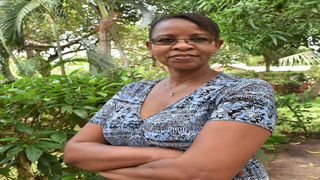
Kenya Progressive Nurses Association chairperson Ms Triza Ireri during an interview with the Nation.africa on April 2, 2021 at her home in Kwale County. She assisted her colleagues who underwent mental anguish during the Covid-19 pandemic with counseling.
| Wachira Mwangi I Nation Media Group.Counties
Premium
Frontline heroes: Seeing fear in my son broke my heart
It is slightly over one year since the Covid-19 pandemic struck within our borders.
In the 14 months, the virus has ravaged the country. Even the most powerful people in our society have not been spared by this virus that knows no class or title.
Nation.africa brings you stories from those on the frontline of healthcare services offering different views of the past year with regard to the pandemic, and how it impacted their everyday lives.
Here is a story of a courageous worker risking her life to save the country during the Covid-19 pandemic.
My name is Triza Ireri, a nurse in Kwale. I am also the Kenya Progressive Nurses Association’s National Secretary.
Having to deal with the novel coronavirus, which we knew nothing about, was scary. The fear of getting infected and anxiety that I would pass it on to my spouse and children…. every day is a scare and a risk.
My work had drastically changed. The routine patients I used to attend to are no longer coming to the hospital to get services as usual. Routine follow-up patients with hypertension would pass up their appointments in fear of contracting the disease.
At first, we were worried about protection of healthcare workers, especially due to inadequate personal protective equipment (PPE).
I am a mother of two who were and are sometimes scared of me. I was heartbroken when I heard my son telling our house help not to get into my car because it frequents the hospital, where there is a lot of coronavirus.
I knew my son was afraid, he was looking at me as a potential source of infection, and it was heart-breaking. I saw anxiety written on my children’s faces, which further broke me because despite taking precautions and staying on high alert, I was still a risk.
I wear my face mask religiously, frequently sanitise, wash hands and keep social distance, not for myself, but for the people I meet as well.
I am glad I never faced stigmatisation, but my colleagues have shared their horrifying experiences. But that was last year when we did not know how to behave towards each other. For instance, a health worker deployed in a Covid-19 isolation centre could be stigmatised by their colleagues.
Mental health problem
The disease has also come with blessings in disguise, meaning we are now talking about mental health and people suffering from the disease are speaking out, seeking treatment and getting cured.
Before the pandemic, mental health was not something we could talk about. But because of fear of coronavirus, we always have debriefing sessions with my colleagues on mental health.
We talk about the disease; we check on each other.
Looking out for each other was helpful. We started offering support and care continuously. I am a counsellor, so I was involved in offering psychosocial support to my colleagues. Activities like zumba sessions also helped.
Physical activities help in relieving stress, but we still have an open line for anyone who needs psychological support through tele-counselling.
The need for mental health services has highly been highlighted during the pandemic and more people are seeking services.
Things have changed in terms of mental health; we now understand the disease, how to manage it and that it cuts across the society. Anyone is at risk of suffering as a result of the disease.
I am always up at 5am in the morning because I work during the day. I have dealt with coronavirus patients; I was not scared because I understood the science behind it. The scare was only if you lacked the protective equipment.
But as the country rolls out the coronavirus vaccine programme, we are optimistic. The vaccine comes in as a hard cover, but you must mask up, wash your hands and maintain social distance.
The vaccine is a welcome strategy that we should embrace. I would want to tell Kenyans that it is okay not to be okay. If you are not okay, reach out because there’s help. We can win this war together.





